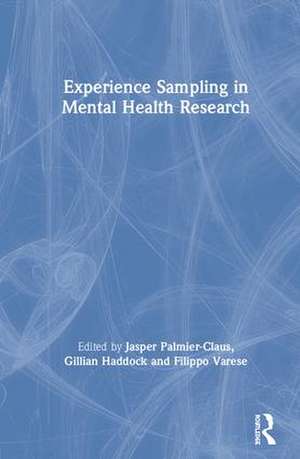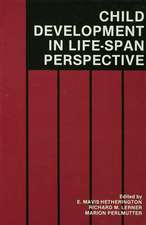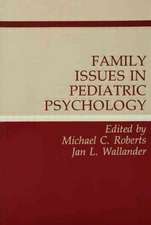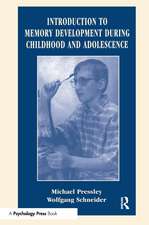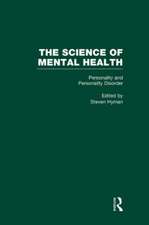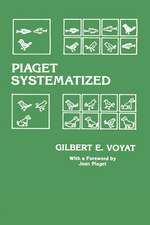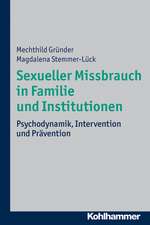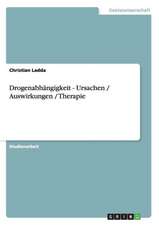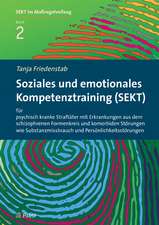Experience Sampling in Mental Health Research
Editat de Jasper Palmier-Claus, Gillian Haddock, Filippo Vareseen Limba Engleză Hardback – 7 feb 2019
Divided into three sections, the book offers step-by-step instruction on how to design, develop and implement an ESM study, as well as advice on how this approach might be adapted for common mental health difficulties. With an eye to the future of this type of research, the contributors also consider how ESM might be adapted for use as a form of clinical assessment and intervention.
Experience Sampling in Mental Health Research combines the knowledge and expertise of leading international experts in the field, and will be helpful for students, researchers and clinicians wishing to start or develop their understanding of this methodology.
| Toate formatele și edițiile | Preț | Express |
|---|---|---|
| Paperback (1) | 381.37 lei 6-8 săpt. | |
| Taylor & Francis – 31 ian 2019 | 381.37 lei 6-8 săpt. | |
| Hardback (1) | 1054.71 lei 6-8 săpt. | |
| Taylor & Francis – 7 feb 2019 | 1054.71 lei 6-8 săpt. |
Preț: 1054.71 lei
Preț vechi: 1286.24 lei
-18% Nou
Puncte Express: 1582
Preț estimativ în valută:
201.88€ • 219.36$ • 169.69£
201.88€ • 219.36$ • 169.69£
Carte tipărită la comandă
Livrare economică 21 aprilie-05 mai
Preluare comenzi: 021 569.72.76
Specificații
ISBN-13: 9781138212855
ISBN-10: 1138212857
Pagini: 176
Ilustrații: 11 Tables, black and white; 10 Line drawings, black and white
Dimensiuni: 156 x 234 x 11 mm
Greutate: 0.45 kg
Ediția:1
Editura: Taylor & Francis
Colecția Routledge
Locul publicării:Oxford, United Kingdom
ISBN-10: 1138212857
Pagini: 176
Ilustrații: 11 Tables, black and white; 10 Line drawings, black and white
Dimensiuni: 156 x 234 x 11 mm
Greutate: 0.45 kg
Ediția:1
Editura: Taylor & Francis
Colecția Routledge
Locul publicării:Oxford, United Kingdom
Public țintă
Postgraduate and ProfessionalCuprins
Chapter 1. Why the experience sampling method?
Author(s): Jasper Palmier-Claus, Gill Haddock & Fillippo Varese
Chapter 2. Designing and conducting an experience sampling study: Where to start?
Author(s): Filippo Varese, Gill Haddock & Jasper Palmier-Claus
Chapter 3. The analysis of experience sampling data
Author(s): Lesley-Anne Carter & Richard Emsley,
Section 2: Experience sampling research for specific mental health difficulties
Chapter 4. Experience sampling in the study of psychosis.
Author(s): David Kimhy & Julia Vakhrusheva.
Chapter 5. Experience sampling in the study of autism spectrum disorders.
Author(s): Dougal Hare, Yu-Wei Chen
Chapter 6. Experience sampling in the study of sleep and wakefulness.
Author(s): Lee Mulligan, Gill Haddock, Donna Littlewood & Simon Kyle.
Chapter 7. Experience sampling in the study of dyads and family dynamics.
Author(s): Debora Vasconcelos e Sa, Samantha Hartley, Christine Barrowclough.
Chapter 8. Experience sampling in the study of self-harm.
Author(s): Dr Daniel Pratt, Dr Peter Taylor.
Section 3: Experiences sampling as an applied clinical tool.
Chapter 9. Emerging applications of prediction in experience sampling.
Author(s): Colin Depp, Christopher N. Kaufmann, Eric Granholm & Wesley Thompson
Chapter 10. The development of ecological momentary interventions.
Author(s): Henrietta Steinhart, Prof Inez Myin-Germeys, Dr Uli Reininghaus.
Chapter 11. Mobile cognitive testing using experience sampling.
Author(s): Prof Joel Swendsen, Dr Pierre Schweitzer, Dr, Raeanne C. Moore
Author(s): Jasper Palmier-Claus, Gill Haddock & Fillippo Varese
Chapter 2. Designing and conducting an experience sampling study: Where to start?
Author(s): Filippo Varese, Gill Haddock & Jasper Palmier-Claus
Chapter 3. The analysis of experience sampling data
Author(s): Lesley-Anne Carter & Richard Emsley,
Section 2: Experience sampling research for specific mental health difficulties
Chapter 4. Experience sampling in the study of psychosis.
Author(s): David Kimhy & Julia Vakhrusheva.
Chapter 5. Experience sampling in the study of autism spectrum disorders.
Author(s): Dougal Hare, Yu-Wei Chen
Chapter 6. Experience sampling in the study of sleep and wakefulness.
Author(s): Lee Mulligan, Gill Haddock, Donna Littlewood & Simon Kyle.
Chapter 7. Experience sampling in the study of dyads and family dynamics.
Author(s): Debora Vasconcelos e Sa, Samantha Hartley, Christine Barrowclough.
Chapter 8. Experience sampling in the study of self-harm.
Author(s): Dr Daniel Pratt, Dr Peter Taylor.
Section 3: Experiences sampling as an applied clinical tool.
Chapter 9. Emerging applications of prediction in experience sampling.
Author(s): Colin Depp, Christopher N. Kaufmann, Eric Granholm & Wesley Thompson
Chapter 10. The development of ecological momentary interventions.
Author(s): Henrietta Steinhart, Prof Inez Myin-Germeys, Dr Uli Reininghaus.
Chapter 11. Mobile cognitive testing using experience sampling.
Author(s): Prof Joel Swendsen, Dr Pierre Schweitzer, Dr, Raeanne C. Moore
Notă biografică
Dr Jasper Palmier-Claus (BSc, MSc, PhD, ClinPsyD), Clinical Psychologist & Lecturer, Division of Psychology & Mental Health, University of Manchester & Greater Manchester Mental Health NHS Foundation Trust, Manchester, UK.
Professor Gillian Haddock (BSc, MClinPsychol, PhD), Head of the Division of Psychology & Mental Health, University of Manchester, Manchester, UK.
Dr Filippo Varese (BSc, MSc, PhD, ClinPsyD), Senior Lecturer & Clinical Psychologist, Division of Psychology & Mental Health, University of Manchester, Manchester, UK
Professor Gillian Haddock (BSc, MClinPsychol, PhD), Head of the Division of Psychology & Mental Health, University of Manchester, Manchester, UK.
Dr Filippo Varese (BSc, MSc, PhD, ClinPsyD), Senior Lecturer & Clinical Psychologist, Division of Psychology & Mental Health, University of Manchester, Manchester, UK
Recenzii
Experience sampling has transformed research into psychiatric disorders, allowing researchers to come out of the laboratory and observe how people interact with their social and physical environment. Until now, however, there has been no easily accessible guide to the field, making it daunting for students, researchers and clinicians to use the technique. This up-to-date and accessible guide is an essential introduction to experience sampling research, with easy to understand practical information about how to set up a study and analyse the results. I highly recommend this book for anybody who wants to better understand how to employ this methodology.
Richard Bentall, Professor of Clinical Psychology, University of Liverpool
This book is a definitive exploration of the rise and rise of experience sampling methodology in mental health research and – increasingly – treatment. The first proponents of ESM were viewed with general scepticism. The notion of subject-generated, rather than clinician-elicited, symptom data was thought to have overly subjective, of dubious validity and unclear application. The status quo of reliance on standardised interview rating scales was dominant. However, this book shows how far ESM has come in terms of its applicability when harnessed to advanced data analytics and digital methods of collection. It is a definitive theoretical exposition as well as a totally practical handbook.
Shôn Lewis MD BSc FMedSci Professor of Adult Psychiatry, University of Manchester
Richard Bentall, Professor of Clinical Psychology, University of Liverpool
This book is a definitive exploration of the rise and rise of experience sampling methodology in mental health research and – increasingly – treatment. The first proponents of ESM were viewed with general scepticism. The notion of subject-generated, rather than clinician-elicited, symptom data was thought to have overly subjective, of dubious validity and unclear application. The status quo of reliance on standardised interview rating scales was dominant. However, this book shows how far ESM has come in terms of its applicability when harnessed to advanced data analytics and digital methods of collection. It is a definitive theoretical exposition as well as a totally practical handbook.
Shôn Lewis MD BSc FMedSci Professor of Adult Psychiatry, University of Manchester
Descriere
Experience Sampling in Mental Health Research provides comprehensive and user-friendly guidance on when and how to apply this methodology in the assessment of clinical populations.
